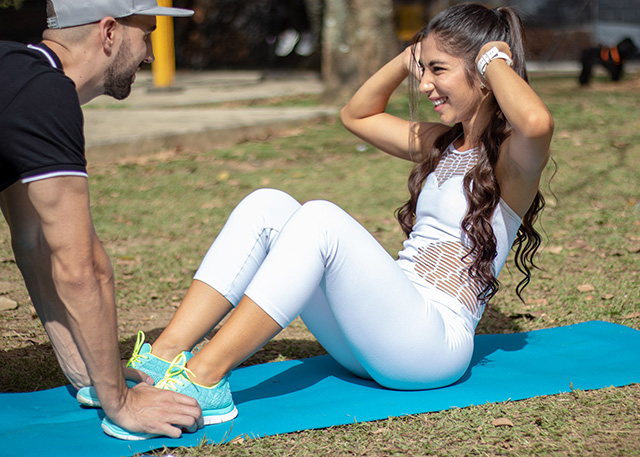This is a general description of a sit-up test to measure abdominal muscle endurance (also called the curl-up or crunch test). The procedure and technique for this test can vary depending on which specific test you are performing. See the procedures section for links to instructions for specific abdominal endurance tests.
test purpose: The curl up test measures abdominal muscular strength and endurance of the abdominals and hip-flexors, important in back support and core stability.
equipment required: flat, clean, cushioned surface, stopwatch, recording sheets, pen. Some variations will also require the following: curl up strips, a tempo device (a metronome, drums, a sit up beep test mp3, the PACER test cd which includes cadences for a sit-up test).
pre-test: Explain the test procedures to the subject. Perform screening of health risks and obtain informed consent. Prepare forms and record basic information such as age, height, body weight, gender, test conditions. Ensure that the participants are adequately warmed-up. See more details of pre-test procedures.
sit-up technique: Described here are the commonly used methods and some general guidelines. The subject lies on a cushioned, flat, clean surface with knees flexed, usually at 90 degrees. Some techniques may specify how far the feet are from the buttocks, such as about 12 inches. A partner may assist by anchoring the feet to the ground. The position of the hands and arms can affect the difficulty of the test. They are generally not placed behind the head as this encourages the subject to stress the neck and pull the head forward. The hand may be placed by the side of the head, or the arms crossed over the chest, reaching out in front. Some protocols use curl up strips or other marks on the ground to slide the hands along and indicate how much to curl up. The subject raises the trunk in a smooth motion, keeping the arms in position, curling up the desired amount. The trunk is lowered back to the floor so that the shoulder blades or upper back touch the floor.
 doing a sit up assessment
doing a sit up assessmenttest procedure: A common method of performing a sit-up fitness test is to record the maximum number of sit ups in a certain time period, such as 30 seconds (Eurofit sit-up test), one minute (President's Challenge Curl Up, home sit up) or two minutes (e.g. in the US Army and US Marines and US Navy). Alternatively, the test may be performed at a set tempo, and the maximum number of total sit-ups is recorded (Fitnessgram curl up, partial sit-up test, President's Challenge Partial Curl Up, NHL curl up beep). For this method, a metronome may be set at the desired tempo, or an audio file or cd with a recording of the pace may be used. The NCF Abdominal Curl Conditioning Test takes this a step further, and has a tempo test that progressively gets faster, much like the running beep test.
Summary of Sit-Up Test Procedures
| Name | Hand/Arms | Knee Angle | Feet Anchored | Up Position | Duration | Tempo |
|---|---|---|---|---|---|---|
| Eurofit sit-up test | behind your head | 90° | yes | torso to vertical position | 30 sec | no |
| Home sit up | resting on thighs | 90° | no | hands touch tops of the knees | 1 min | no |
| President's Challenge original | arms crossed over chest | heels 12 inches from buttocks | yes | elbows touch the thigh | 1 min | no |
| US Army APFT | behind your head | 90° | yes | torso to vertical position | 2 min | no |
| US Marines PFT | arms crossed over chest | 90° | yes | elbows or forearms touch the thighs | 2 min | no |
| US Navy PRT | arms crossed over chest | heels 10 inches from buttocks | yes | elbows touch the thigh | 2 min | no |
| President's Challenge Partial | resting on thighs | ? | no | fingertips touch the knees | max | 1-in-3 sec |
| Connecticut Partial sit-up test | resting on thighs | heels 12 inches from buttocks | no | shoulders up two inches | max | 1-in-3 sec |
| Fitnessgram curl up | on floor next to hips | 140° | no | move hands 3.0" or 4.5" across strip | maximum of 75 | 1-in-3 sec |
| NHL curl up beep | arms crossed over chest | 90° | no | elbows touch thighs | maximum of 100 | 25/min |
| NCF Abdominal Curl Conditioning Test | ? | ? | ? | ? | max | progressive |
scoring: The completion of one complete curl-up (up and back) counts as one. The sit-up must be performed correctly for it to be counted. For the tempo tests, the test is continued until the subject cannot maintain the rhythm or has reached the target number for the test.
advantages: the sit-up is simple to perform requiring minimal equipment, and large groups may be tested at once.
disadvantages: a curl-up with the feet held increases the involvement of the hip flexor muscles, making the test less valid as a measure of abdominal strength. It is sometimes difficult to determine if a correct sit up is performed, and there may be a dispute about the total number. When using the tempo method, the instructor should have clear guidelines of when they terminate the test.
comments: Make sure that the subject does not "bounce" off the floor - only correctly performed curl ups should be counted. The partner may assist by counting aloud the number of repetitions. It is important that the correct technique is used as described for accurate comparison to the norms. If using a variation of the test, the actual technique and procedure should be recorded with the results, and appropriate norm tables consulted.
guidelines: before conducting any fitness test, you should review each person's medical status to identify medical, orthopedic or other health problems that should be considered. Before starting, make sure the correct techniques for all tests are explained. (see the Fitness Testing Guidelines for more info)
Similar Tests
- 30 seconds test (Eurofit sit-up test)
- One minute tests (President's Challenge Curl Up Test, home sit up)
- Two minutes tests (e.g. in the US Army and US Marines and US Navy).
- Tempo tests (Partial sit-up test, President's Challenge Partial Curl Up, Fitnessgram curl up, NHL curl up beep, NCF Abdominal Curl Conditioning Test)
Related Pages
- About Abdominal Testing
- Online sit-up metronome where you can set your own pace.
- Buy the Abdominal Curl Conditioning Test or the Sit Up Beep Test cadence cds.
- The PACER test cd includes cadences for a sit-up test.
- Videos of Sit Up Fitness Tests
- Sit up exercise at the beach or at home
- Sit Up World Records


 Current Events
Current Events